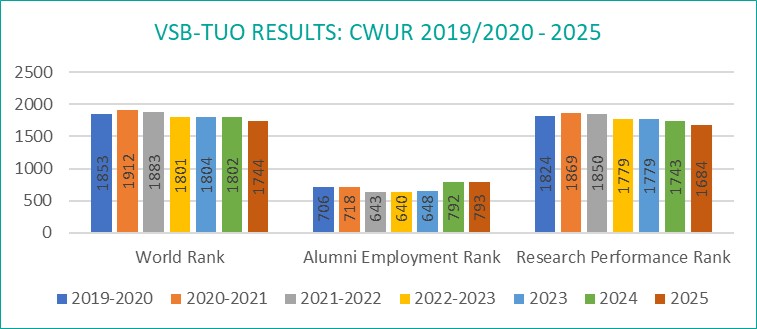VSB-TUO improves its position in the CWUR international ranking
This year, as in the previous one, 11 Czech public universities are featured in the ranking. VSB-TUO maintained its 10th place nationally.
“According to the latest ranking, VSB-TUO ranks among the top 8.2% of universities worldwide. It scored in two of the four main areas – Employability and Research. In the Employability category, which measures the professional success of alumni, the University retained a similar ranking to last year at 793rd place, while in Research it made a notable leap, rising from 1,743rd to 1,684th place,” said Kateřina Angus, International Evaluation and Rankings Officer at VSB-TUO.

Research performance is assessed based on the number of publications, the quality of articles in prestigious journals, publication influence, and citation rates.
In the Employability category, only two Czech universities were ranked: VSB-TUO and Charles University (ranked 1,289th).
In contrast, all Czech universities appeared in the Research category, with Charles University leading, followed by Masaryk University and Palacký University Olomouc. VSB-TUO again placed 10th nationally in this area.
In the Education category, which considers the number of alumni receiving prestigious awards, two Czech universities appeared: Charles University (333rd) and Czech Technical University in Prague (415th).
No Czech university appeared in the Faculty category, which evaluates the quality of academic staff based on top academic distinctions.
The global ranking is led by Harvard University, the Massachusetts Institute of Technology (MIT) and Stanford University. he only non-US universities in the top 10 are the University of Cambridge (4th) and the University of Oxford (5th).
CWUR is an independent consulting organisation based in the United Arab Emirates, compiling global university rankings since 2012. Originally launched in Jeddah, Saudi Arabia, the ranking started as a project listing the top 100 universities. In 2019, it was expanded to the current Global 2000 list.
Unlike some other rankings, CWUR does not conduct surveys among academics nor does it rely on data provided directly by universities. The assessment is based solely on objective data, primarily from publicly available databases and Clarivate Analytics. The CWUR methodology uses seven objective and robust indicators, grouped into four categories: Education (25%), Employability (25%), Faculty, and Research (40%).
The CWUR 2025 results are available here.
Text: Martina Šaradínová, PR Specialist for R&D
Photo: VSB-TUO archive